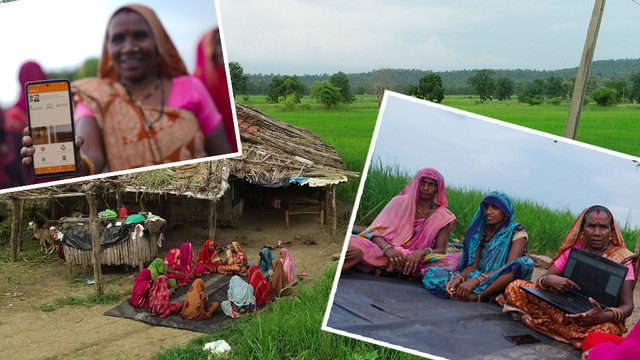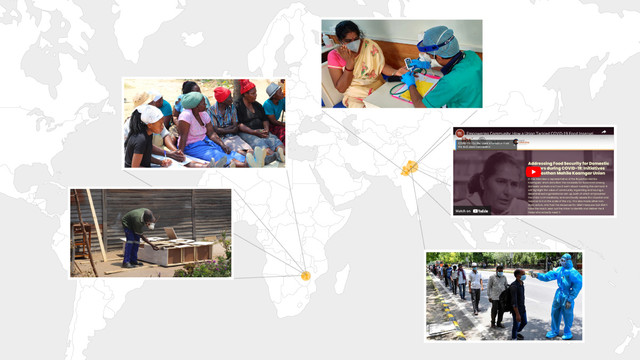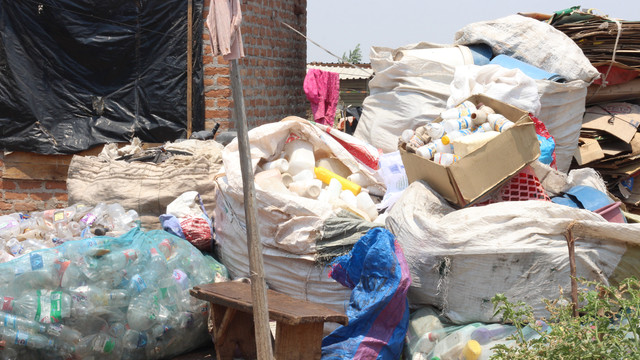Social protection and urban informality: how Zimbabwe tackled COVID-19
COVID-19 affected informal economy workers across Africa and globally. Local forms of social protection helped many cope with the economic and health consequences of the pandemic, as they lacked access to social insurance or assistance for extreme poverty.

Social assistance schemes helped some people in Zimbabwe, but many struggled to register and the assistance often didn't suit the short-term needs of people in informal settlements (Photo: KnowYourCityTv Zimbabwe (KYCTv Zimbabwe))
The COVID-19 pandemic has disrupted the lives and livelihoods of millions of informal economy workers across the globe and in Africa.
Without access to social protection that provides the necessary cushioning against shocks, market vendors, domestic workers and their families have limited means to cope with the socio-economic and health impacts of pandemics.
While not all workers within the informal economy are poor, most are highly vulnerable to poverty, earning low and irregular incomes. They are not covered by social insurance available to those in the formal labour economy, or social assistance delivered to those in extreme poverty.
The COVID-19 crisis required countries to strengthen their social protection programmes and support the most vulnerable as quickly as possible. In Zimbabwe the right to social security and social protection is defined generally in the provisions of the Constitution of Zimbabwe, Section 30 of Chapter 1. Sections 81, 82 and 83 of this constitution, respectively provide for the rights of children, the rights of the elderly and the rights of persons with disabilities.
While short-term emergency programmes can be an important element of income security for informal households, they do not address the longer-term need of informal economy workers.
Escalating risks
One reason is the longstanding vulnerability in the informal economy that limits the ability of informal workers to cope with risks that may occur throughout the lifecycle. Another reason is that income risks have escalated during confinement and will remain very high in the post-confinement period as many important sectors for informal economy workers have been devastated.
Emerging trends show that reducing exclusion of informal economy workers is complex, but possible. Innovative policy solutions to extend social protection coverage to informal economy workers are within reach for countries at various levels of development.
A systemic shift is needed to address the social protection gap in order to realise social protection systems and measures for all, including floors, as called for in the Sustainable Development Goal 1.3.
In Zimbabwe there were various social assistance programmes catering for vulnerable communities, such as the Basic Education Assistance Module (PDF), unconditional cash transfers. However, there were challenges in extending these social protection relief to informal settlements, such as a lack of knowledge and awareness of what communities can access, their rights and entitlements.
Furthermore, given the stringent beneficiary selection with these relief schemes, those living informally stand a lesser chance of inclusion given that they are ‘formally recognised by local authorities’.

Some essential supplies being distributed to beneficaries during the COVID-19 pandemic (Photo: KnowYourCityTv Zimbabwe (KYCTv Zimbabwe))
Challenges to extending social protection
The main challenges of extending or incorporating social protection in the informal sectors are:
- Difficulty in registering and contributing: bureaucratic structures and procedures make it difficult for those living informal to be registered and recognised on beneficiary lists, and
- Inappropriate benefits: most social protection schemes formulated to cater for long-term benefits such as pensions and require most workers to have consistent contribution towards social protection taxes. However, this is inappropriate for people living in informal settlements as they have short-term needs that they need to cater for.
The existing social protection systems present a scenario where ‘exclusion occurs within exclusion’ - there is a need to develop inclusive social protection schemes that are inclusive of those living and working informally.
Recommendations for action
Some of the recommendations that can adopted to improve and provide for those working and living informally are:
- Adjust existing social protection schemes: the government can work towards adjusting the existing social protection schemes to the specific informal economy context. This would in turn provide those living and working informally a chance to benefit from social protection programmes
- Integrate existing schemes: another approach can be to gradually integrate existing micro-insurance arrangements into the national social insurance scheme, and
- Strong partnerships between government, private sector and civil society organisations: stakeholders should create cooperative collaborations and platforms through which those living and working informally can access and benefit from social protection programmes. These stakeholders could also build the capacity of the informal worker associations to be able to build resilient communities.
Further resources
Outside the box: the resilience that keeps the economy moving
Examining the robustness of Zimbabwean social protection mechanisms in the context of Corona Virus Disease 2019 (COVID-19), Tatenda Goodman Nhapi (2021), African Journal of Social Work Vol. 11 No. 4
This article was compiled by Dialogue on Shelter's Tarisai Natalie Manyowa.



